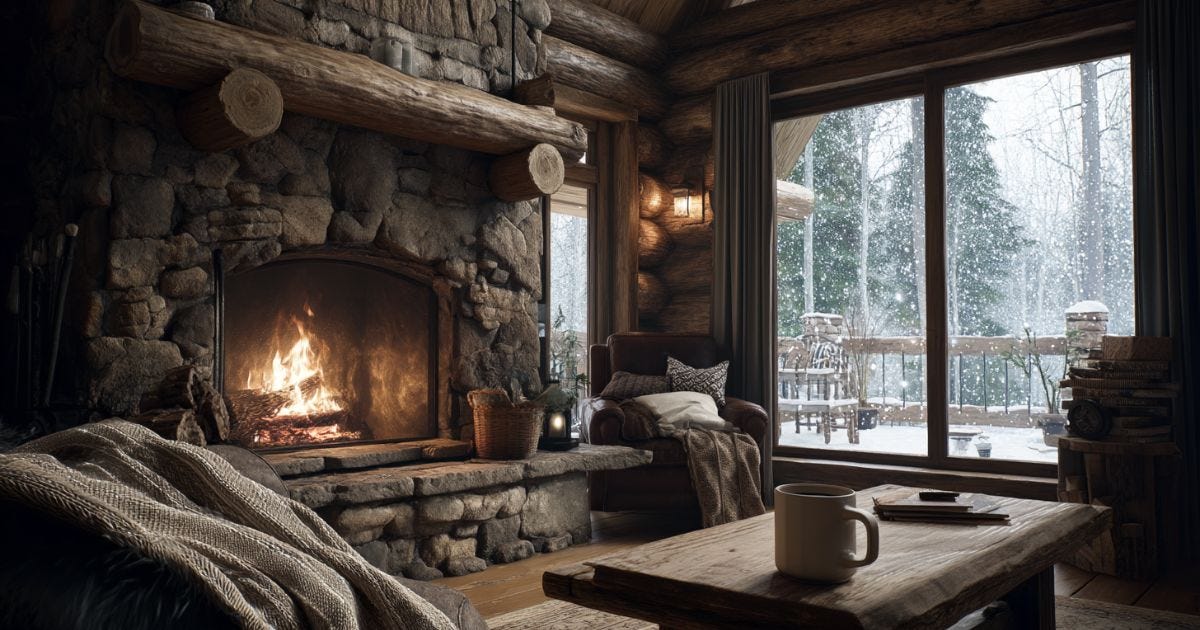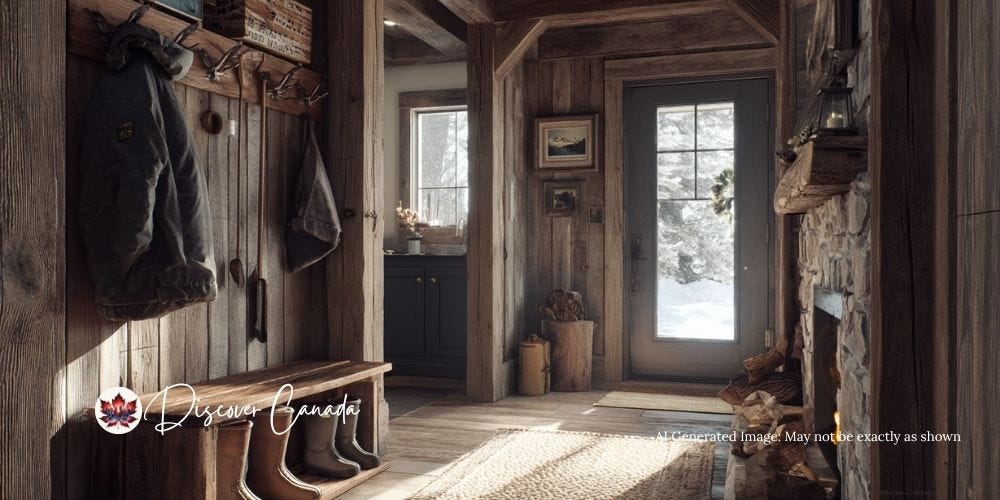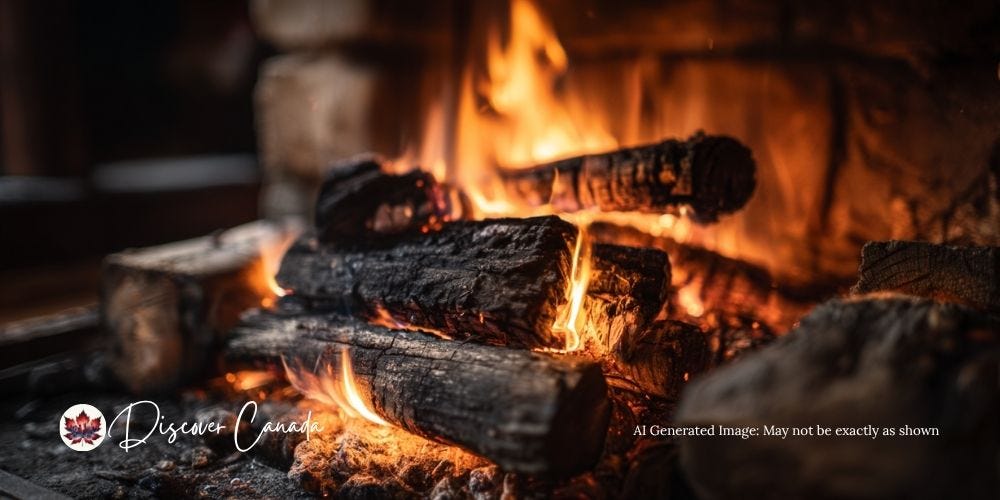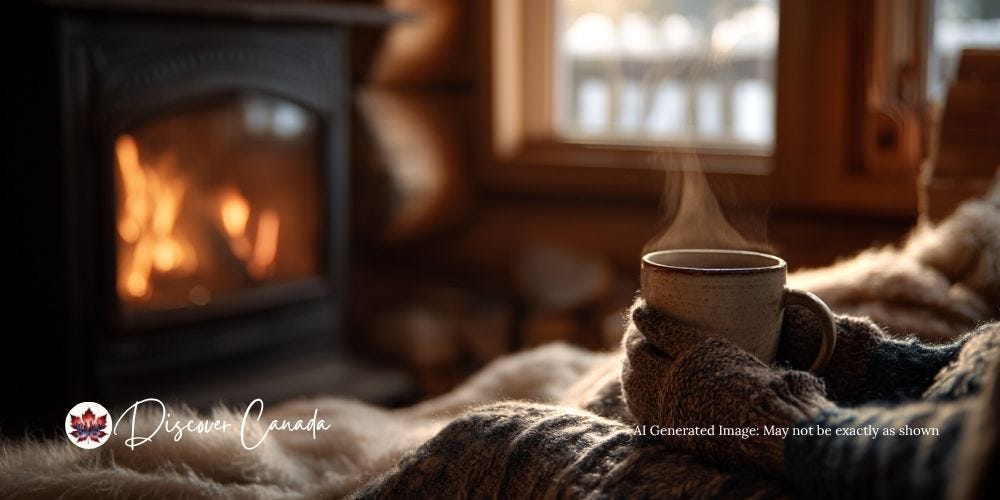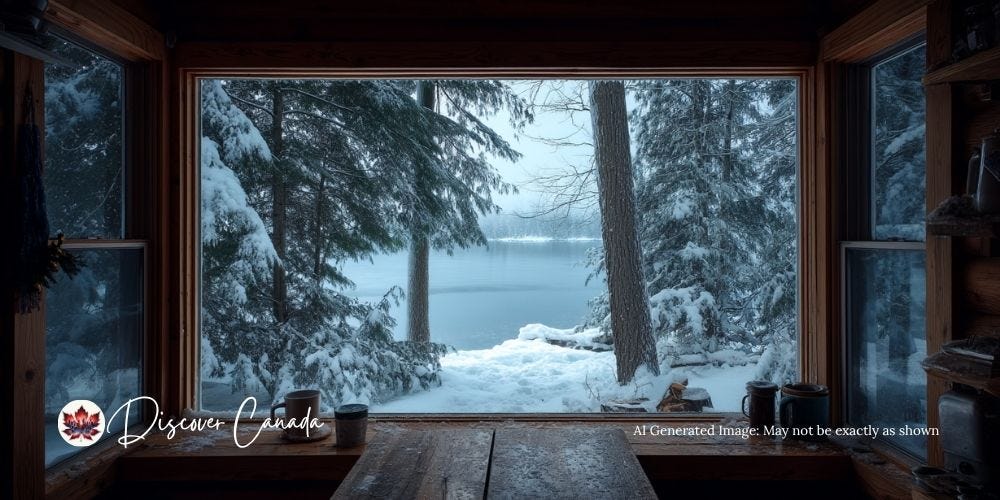Why Doing Nothing Might Be the Most Canadian Skill We Have
A cozy winter story about fires, stillness, and the beauty of slowing down.
🎧 Listen While You Read
Imagine a crackling fire, a wool blanket, and the kind of quiet that feels like it’s been waiting for you.
A Cabin, a Fire, and the Art of Doing Nothing
There’s a particular kind of stillness you only find in a cabin.
Not the polite quiet of a city at night, and not the hurried silence between commitments — but a deeper, older kind of calm. The type that lives in pine walls, creaking floorboards, and a fireplace that always seems to know what you need before you do.
Maybe you’ve felt it.
You step inside, shake off the cold, hang your coat, and suddenly… the world feels lighter. The kettle hums softly on the stove. The fire snaps in that reassuring way only woodfires can. Outside, the first snow drifts down like a slow curtain. Inside, time stretches — not endlessly, but generously.
In that moment, doing nothing isn’t procrastination or indulgence.
It’s an instinct — a reminder that your mind deserves the same calm the cabin offers without trying.
✨ Key Takeaways
🔥 Doing nothing is restorative, not wasteful — a quiet return to yourself.
🌲 Slow living is part of the Canadian rhythm, from lakeside cabins to winter mornings.
❄️ Before the holiday rush sweeps in, a single peaceful evening can reset your whole pace.
The Cabin Reset
There’s a moment right after you step inside a cabin where everything in you exhales — even the parts you didn’t realize were tense. The air feels different here: a little drier from the woodstove, a little sweeter from the pine walls, a little quieter in a way that makes the rest of your life feel like background noise.
You take off your boots and hear the soft thud against the floorboards. You shrug out of your coat, and it hangs heavier than you expected — like it’s been carrying more than snow. The fire greets you with a low, steady crackle, as if it’s been waiting all day for someone to sit beside it.
Nothing is urgent here.
The clock on the wall ticks, but it doesn’t demand anything. The kettle on the stove warms lazily, not rushing toward a boil. Even your phone looks out of place, like a visitor from another planet.
A cabin resets you in a way no productivity app or self-help mantra ever could. It gives your mind permission to soften, unclench, and remember what it feels like to arrive somewhere — not physically, but emotionally, truly.
The Fire as Therapy
There is something ancient about sitting in front of a fire. Not metaphorically. Truly ancient. Humans have been gathering around flames longer than we have been writing, farming, or trying to figure out what to do with email. Maybe that is why a woodfire feels less like heat and more like memory.
You settle into a chair and the warmth reaches you slowly, almost cautiously, as if it knows how to approach without overwhelming. The crackles are soft but deliberate. Every spark feels like a tiny punctuation mark in a conversation you did not realize you were having with yourself.
You stare into the embers. They breathe, collapse, glow again. Your mind finally begins to follow that rhythm. Thoughts slow down. Worries that felt sharp begin to soften. The fire is not fixing anything, but it makes everything feel a little more manageable.
There is no multitasking here. No tabs open. No background noise. Just you and a living, breathing rhythm older than winter itself.
For a few rare minutes, you are allowed to be a person instead of a list of things to do.
That is the quiet therapy a fire offers. It does not demand your attention. It simply earns it.
The Permission to Do Nothing
Doing nothing sounds simple, but it is one of the hardest things many of us try to do. We are so used to earning our rest, proving our worth, finishing one more task before we allow ourselves even a moment of calm. A cabin strips all of that away. No deadlines are waiting in the rafters, and no notifications are hiding behind the trees. There is only the quiet honesty of the present moment.
You sit down on the edge of the couch, hands wrapped around a warm mug, and your mind begins to protest out of habit. Shouldn’t you be doing something? Shouldn’t you check something? Shouldn’t you plan the next thing? But the longer you sit, the softer that inner noise becomes. It fades like footsteps in snow, one thought at a time.
Doing nothing is not avoidance. It is restoration. It is the pause before the next chapter. The simple act of letting your mind drift without purpose feels unfamiliar at first, but after a few minutes, something shifts. You begin to remember how to breathe without urgency and how to exist without performing.
In a world that pulls us in a hundred directions, choosing stillness is not laziness. It is a form of strength. And once you taste even a moment of it, you start to wonder why you ever treated it like a luxury instead of a need.
A Little Bit of Canada in All of Us
Slow living comes naturally in Canada. It is stitched into the way our seasons move and the way our landscapes breathe. Spend enough time beside a frozen lake or on a quiet forest trail, and you begin to understand why Canadians have such a deep relationship with stillness. Our geography permits us to pause. Our winters practically insist on it.
There is something comforting about the way snow falls with purpose yet without hurry. The way small towns wake up slowly, letting the day arrive instead of chasing it. The way a cup of coffee tastes better when the air outside bites just enough to make the warmth feel like a reward. These moments remind us that life does not always need to be loud to feel full.
Even if you are nowhere near a cabin, the spirit of one is never far away. It is in the quiet corner of your home that you keep meaning to sit in. It is in the warm light of a lamp on a cold evening. It is in the deep breath you take before stepping into the holiday rush. That small, steady calm is something we all carry, even when we forget it is there.
Canada teaches us that slowing down is not an escape. It is a way back to ourselves. And that lesson stays with you long after the fire burns low.
Pro Tip
Take one evening this week to do absolutely nothing on purpose. Sit with a warm drink, turn off every screen, and let your mind settle. You might be surprised by how quickly your thoughts start to breathe again.
Closing Reflection
When the fire burns low and the evening stretches quietly into night, you realize that nothing extraordinary happened. You did not solve a problem, finish a project, or chase down anything at all. Yet somehow you feel lighter. Calmer. A little more like yourself.
That is the secret gift of a cabin evening. It reminds you that peace is not found in grand gestures or dramatic changes. It lives in small rituals, in warm light, in the gentle courage it takes to let the world wait for a while. You can step back into the busyness tomorrow. You can pick up the pace again when you are ready. But for now, you have allowed yourself something rare and necessary, a pause.
Carry that feeling with you into the weeks ahead. Let it soften the edges of the holiday rush. Let it remind you that you do not have to earn your breath or justify your rest. Sometimes doing nothing is precisely what you needed all along.
If This Brought You a Moment of Calm
If this little pause gave you a breath of peace, feel free to share it with someone who could use the exact quiet moment. And if you want more slow-living stories, cozy Canadian reflections, and gentle escapes each week, you can subscribe and join me for the next one.



